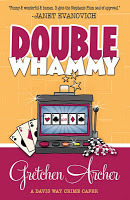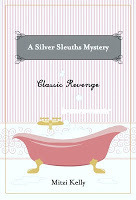Riley Adams's Blog, page 154
May 26, 2013
Memorial Day Break

Hope my blog readers in the States will
have a nice Memorial Day.
I’m taking a
break today from blogging, but will return Wednesday.
Published on May 26, 2013 21:01
May 25, 2013
Twitterific
by Elizabeth S. Craig, @elizabethscraig

Twitterific links are fed into the Writer’s Knowledge Base search engine
(developed by writer and software engineer Mike Fleming) which has over 19,000
free articles on writing related topics. It's the search engine for writers.
Sign up for our free newsletter for monthly
writing tips and interviews with top contributors to the WKB or like us on Facebook.
Mike Fleming worked with author and
writing coach James Scott Bell to offer an online, interactive, writing program
to help make your next novel great. It's called "Knockout Novel" and
you can learn more about it at Knockout
Novel.com.
Big news for BEA--6 top indies have a
booth. Is the BEA ready? http://bit.ly/16em6Vl
@bellaandre @cjlyonswriter @Porter_Anderson @hughhowey
Garroting as a
murder method in crime fiction: http://bit.ly/Z7qbHM
@mkinberg
Can we love our second book as much as
our first? http://bit.ly/Z7z97L @HartJohnson
@JohannaGarth
What do authors owe publishers?Ann
Patchett's remarks in @thebookseller cause furor: http://bit.ly/12JdgKp @MickRooney7777
@Porter_Anderson
The need for self-pub work to be
well-produced--and the associated costs: http://bit.ly/13L23dw
@miralsattar @Porter_Anderson
Creating great blurbs from negative
reviews: http://wapo.st/18iREXv
@RonCharles @washingtonpost
How to Write a Book in 3 Days: Lessons
from Michael Moorcock: http://bit.ly/14EMh3g
via @this_distracted
3 Ways to Add Repetition That Pleases
Readers: http://bit.ly/14YQyOJ @KMWeiland
A closer look at Amazon's fan fiction
program, Kindle Worlds: http://bit.ly/11jgGp4
@flourish @scalzi @Porter_Anderson
A free directory of
cover designers, formatters, freelance editors, and more: http://bit.ly/nolbXq
The Search Engine for Writers: http://hiveword.com/wkb/search
11 Ways Stay-at-Home Moms (and Other Busy
Folks) Can Find Time to Write: http://bit.ly/10wUfYe
@KMWeiland @devtflaherty
The Reality of Writing for Content Mills
— 14 Writers' True Stories: http://bit.ly/15vRwWQ
@TiceWrites
Why We (and our characters) Fall in Love:
http://bit.ly/10wUO4v @FaeRowen
5 Writing Lessons 1 Writer Learned from
Being an Editor: http://bit.ly/15vRFJO
@diymfa @emilywenstrom
A reluctant poet: http://bit.ly/10wVarJ
The Rule of Three in Writing: http://bit.ly/15vSd2q @SKRViLL
Getting Comfy with the Discomfort: http://bit.ly/10wX2km @SarahrCallender
What 1 writer loves about notebooks: http://bit.ly/15vTkiP @Jennifer_Castle
Speculative fiction: the superset of all
possible literature: http://bit.ly/10xal4g
@shunn
Washington Post's Outlook avoids these
words and phrases: http://bit.ly/15wNPjO
Why The End Of Professional Magazines May
Be In Sight: http://bit.ly/10xNnKq
Selling Yourself as a Writer: http://bit.ly/15wO12x @robertleebrewer
@ShaunEHorton
Labels of an introverted writer: http://bit.ly/10xNJk9 @hopeclark @danasitar
The Point of the Paperback: http://bit.ly/15wOtOg @nicholebernier
@the_millions
Inventing New From Old: http://bit.ly/15wOxNQ @mooderino
3 Storytelling Methods to Improve Your
Writing or Speaking: http://bit.ly/10xO5qZ
@dennisbrooke @bloggingbistro
3 Ways to Reuse Your Research: http://bit.ly/15wOJNj
"I Love Your Story Anyway!" --
Tales From the Unintended Audience: http://bit.ly/10iAzdQ
@museinks
10 tips for handling public pressure and
online vitriol without losing it: http://bit.ly/10NQ1KG
@ajackwriting
7 Tips for Choosing Your Book Cover Art: http://bit.ly/10iAE15 @charmaineclancy
Maximizing Your Fallow Season: http://bit.ly/10NQf4u @JMHochstetler
@SouthrnWritrMag
How to Write Great Analogies: http://bit.ly/10NQUmx @ava_jae
8 Types of People Who Attend Writing
Conferences: http://bit.ly/10iBhaW
@writersdigest
Converting Posts to Resource Pages: http://bit.ly/10NRCjG @JFBookman
When The Writing Challenges Are All
Mental: http://bit.ly/10NRH7b
@nataliewhipple
Don't Be a Hater: On Lit Mags and Their
Covers: http://bit.ly/10iBsTB @grubwriters
@thereviewreview
Do We Expect Too Much Realism in Our
Stories? http://bit.ly/10NRUXW
@Janice_hardy
Robert Frost's 10 favorite books: http://bit.ly/10iBD1f @csmonitor
11 quick + dirty things about writing: http://bit.ly/10NSAwv @justinemusk
2 tips to help you build your online
presence: http://bit.ly/10iBURN
@BloggingTipsCom
Writers Writing About Writers Writing
About … http://bit.ly/10NSO6J
@amazingstories0
What It Takes to Be a Real Author CEO: http://bit.ly/10iBYks @kristenlambtx
The Sting of a Negative Review: http://bit.ly/10NT0CY @V_Rossibooks
Busting publishing myths: http://bit.ly/10iCaQJ @rachellegardner
Self Esteem and Avant-Garde Cinema: http://bit.ly/10NTcC8 @scriptmag
Literary Agents Are Watching Blogs &
Amazon Bestseller Lists: http://bit.ly/10iChMl
@galleycat
7 Publishing Tips 1 Writer Learned at the
Writer's Digest Conference: http://bit.ly/10NTjxI
Making a Social Media Marketing Calendar:
http://bit.ly/10iCmPY @vgrefer
How To Get Honest Book Reviews: http://bit.ly/12rcgco @woodwardkaren
What do readers want from front matter
and end matter? http://bit.ly/YOxBQ0
When you don't want a blog--the basic
author website: http://bit.ly/YOyc4j
@Trucking_Lady
25 Tactics to Promote Your Blog via
Facebook and Twitter: http://bit.ly/12reh8B
@heidicohen
The Short Story on Structuring Your Short
Story: http://bit.ly/12remsV @storyfix
The Real Reason Why Science Fiction
Westerns Are Such a Hard Sell: http://bit.ly/YOytEn
@i09
An analysis of 1 book's opening: http://bit.ly/12reKaJ @Janice_hardy
Physical attribute thesaurus--head: http://bit.ly/YOyBUj @angelaackerman
Your Website Images - Be Careful What You
Delete: http://bit.ly/YOyHeH @karencv
Top 20 Greatest Sci-Fi & Fantasy TV
Show Finales: http://bit.ly/12rf75b
@sfxmagazine
Five Year Writing Plans: http://bit.ly/YOyRmc
"Most contemporary literary fiction
is terrible" : http://bit.ly/12695X5
@salon @jrobertlennon
Tips for effective linking in WordPress
blogs: http://bit.ly/10ICCJL
@BloggingTipsCom
Burning the Manuscripts: http://bit.ly/1269EjS @henriettepower
Spice Up Your Writing: http://bit.ly/10ICXMB
Trading favors and our integrity: http://bit.ly/126a5dY @KSElliott_Shark
Advice for trad. published writers now
interested in self-pub: http://bit.ly/10IDqi3
@jamesscottbell
The Numbers Game: What to do after you've
submitted a short story: http://bit.ly/10IDuy6
@amazingstories0
Fantasy Weapons – the Good, the Bad, and
the Ugly: http://bit.ly/10IE8vB @Chilari
How to move your story: http://bit.ly/126xb44 @lindasclare
7 strategies for ebook pricing: http://bit.ly/YFkQ82 @digibookworld
The Five Cornerstones of Dramatic
Characterization: http://bit.ly/126xJqK
@thecreativepenn @DavidCorbett_CA
Utopia and Dystopia – The Many Faces of
The Future: http://bit.ly/YFl27h
@VeronicaSicoe
3 Tips for Hooking Readers: http://bit.ly/126y6Se @MissyTippens
The Thin Line between Character Strengths
and Flaws: http://bit.ly/YFt2VX @jamigold
Are We Badgering Readers? http://bit.ly/10EnkBj @BTMargins
@randysusanmeyer
Creating Your Fantasy Bible: http://bit.ly/YFtfbu @ThereDraftAgain
Leave In Everything: http://bit.ly/10EnpoC @mooderino
Using Zombies To Eliminate Passive Voice:
http://bit.ly/YFtpjm
How to Stop Self-Sabotaging: http://bit.ly/10EnHvt @RealE
How to Increase Tension in your Story: http://bit.ly/YFu5VO @shalvatzis
Break the Rules to Become a Best Seller: http://bit.ly/10EnIzv @livewritethrive
5 Things Fiction Acquisition Editors
Never Say: http://bit.ly/YFubg0 @novelrocket
It's not enough to write the book. Self-pubbed authors must think about
business: http://bit.ly/10EnNTQ
@nataliegayle1
Links to help with the querying process: http://bit.ly/YFuibD @ingridsundberg
Editors: Freelance v. In-house: http://bit.ly/10EnSa6 @fictorians
Dear author: your name is your brand.
Here's why: http://bit.ly/YFutUc
@JosieBrownCA
4 Words That are Killing Your Prose: http://bit.ly/16b7zJQ @write_practice
The Care and Feeding of Secondary
Characters: http://bit.ly/16b87iO
Algorithms—Are They Killing the
"Kindle Revolution"? http://bit.ly/13igsKD
@annerallen
3 Ways to Improve Your Author Website
Today: http://bit.ly/16b8zNV @janefriedman
Handling conflict in a virtual world
(esp. in online writing communities): http://bit.ly/16b9qOE
@Jan_Ohara
Elements that can make a story fail: http://bit.ly/YTTn4J
Know Your Characters: http://bit.ly/129iL3c
The Three Levels of Commitment: http://bit.ly/YTTxt1 @jeffgoins
5 Ways Publishers Can Be More Like
Start-Ups: http://bit.ly/129iVaO
@pubperspectives
Short story prompts: http://bit.ly/129nQbF @storyadaymay
4 Ways Blogging Will Make You a Better
Writer: http://bit.ly/104TJUm @diymfa
@danblank
Self Publishing Video Tutorials: http://bit.ly/10cxgkl @galleycat
No Matter the Genre, Many Great Books
Start With a One Sentence Idea: http://bit.ly/1422Ups
@bob_mayer
Why 1 writer chooses to write erotic fan
fiction: http://bit.ly/1423tzy @ClarionUCSD
The Writing Conference Trifecta: http://bit.ly/18Kt6I7
Write a killer first line: http://bit.ly/1423SBY @MartinaABoone
@finneyfrock
The art of story Velcro: http://bit.ly/18KtBlt @Rachel_Aaron
What Downton Abbey Can Teach us About
Tension: http://bit.ly/18KudaM
@Janice_Hardy
Agent lessons from a conference panel: http://bit.ly/1426zU6
Comparison is the thief of joy: http://bit.ly/18KuL06 @tawnafenske
Life with a Writer: http://bit.ly/18KvWN6 @GingerJohnson_
Pitching dos and don'ts: http://bit.ly/14288Bi @gordonwarnock
Should Being Creative Feel Good? http://bit.ly/18Ihv9q @brandenbarnett
Agent advice for better manuscripts: http://bit.ly/18Kwvq9
When writers hesitate to send out their
work: http://bit.ly/10ygY5j @evilwriters
What 1 writer does when she gets stuck
while writing: http://bit.ly/10yh90o
@Word_Wrestler
Instant gratification and pacing: http://bit.ly/10yhf8s @KristenJett
How 1 agent prepares for an author
submission: http://bit.ly/17uiHkG
Writers Write – Seeing the Cliché Through
New Eyes: http://bit.ly/10yhznE
@matty_gibbon
A Peek at the Real Life of That Writer
You Envy: http://bit.ly/17uiWw5 @TiceWrites
What would you write if you weren't
afraid? http://bit.ly/YMHwmS
@rachellegardner
Full Shot for Full Effect: http://bit.ly/13pqd9J @livewritethrive
The Agony and the Ecstasy:
Self-Publishing: http://bit.ly/13pqlG9
@PattiHill
The Slow Language of Sculpture, the Fast
Language of Words: http://bit.ly/13pqsBR
@the_millions
What New Skills Do Publishers Need to
Navigate in Publishing? http://bit.ly/YMI4Ju
@pubperspectives
The 3 forces that are shaping 21st
century book publishing: scale, verticalization, and atomization: http://bit.ly/13pr1LS @PassiveVoiceBlg
4 ways to improve your writing through an
online writing workshop: http://bit.ly/YMInEj
@bookbaby
How To Write Episodic/Serialized Fiction:
http://bit.ly/13prjSP and http://bit.ly/13prmhu @woodwardkaren
Storytelling--Know the Three Levels of
Tradecraft: http://bit.ly/YMIEqG
@cockeyedcaravan
The end game: http://bit.ly/14c1ety @JoeMoore_writer
When characters age in a series: http://bit.ly/14c1tVg @rachelnseigel
Writing partner etiquette: http://bit.ly/14c1LM3 @KenLevine
How to Use Stream of Consciousness: http://bit.ly/14c1SXW @kmweiland
5 Easy Ways to Overcome The Fear of
Public Speaking: http://bit.ly/14c22yy
@jesslaw
Why We (and Our Characters) Fall in Love:
http://bit.ly/1098GoW @FaeRowen
Defeat Distraction: Refocusing with
Purpose: http://bit.ly/14c2pJq @LeoBabauta
Script To Screen: "Young
Frankenstein": http://bit.ly/1098Nkt
@gointothestory
Beating Creative Block: 10 Ways to Bring
Back Creativity: http://bit.ly/1098ZjJ
@youthedesigner
How to start a group blog: http://bit.ly/14c3vEU @diymfa
The Pros of Professional Development: http://bit.ly/14c3IrO @bluemaven
How to Create an Author Page on Facebook:
http://bit.ly/1099v1f @juliemusil
5 Rules For Writing A Murder Mystery:
Keeping the Murderer Secret Until The End: http://bit.ly/109anCM
@woodwardkaren
The History of Serialized Fiction Gets a
New Chapter: http://bit.ly/109asGR
@AndrewLiptak
Owen Egerton's 30 Writing Tips: http://bit.ly/10Z28ut @woodwardkaren
Words don't exist in a vacuum: http://bit.ly/12JzVVF @lkblackburne
Why writers should use food in their
stories: http://bit.ly/10Z2n8N
@write_practice
How James Patterson Made 94 Million
Dollars Last Year: http://bit.ly/12LP9e0
@Gretchen_Archer
Published on May 25, 2013 21:01
May 24, 2013
Three Types of Good Story Repetition

Today I'm over at
K.M. Weiland's Blog, WordPlay (a fantastic writing craft blog, if you haven't visited),
talking about three
types of good repetition for our
stories. Hope you'll pop over.
Published on May 24, 2013 01:00
May 21, 2013
How Convenient--Plot Contrivance
by Elizabeth S. Craig, @elizabethscraig

Morgue File--o0o0xmods0o0o
Sometimes when we’re drafting a book or
writing an outline, we’ll run into something that needs
to happen in the plot, but is clumsy, or seems convenient or contrived.
I’m working on something now and ran into
this problem. As a matter of fact, I’ve
run into this same exact problem in a different manuscript. I need to have my sleuth’s home broken into.
How can I get away with that? She has
nosy neighbors. She’s alert. She’s, as a matter of fact, an insomniac. The villains in my stories are gifted
amateurs, not career criminals with a knack for picking locks.
It’s difficult to make this break-in
happen without making my sleuth appear dumb, forgetful, careless, or generally
unfit for sleuthing.
Why would she leave a door unlocked when
there is a killer afoot? How could my
newbie killer easily and stealthily break into her house, if she hasn’t left
the door unlocked?
How will she get away from this intruder
once he gets in? He intends to murder
her since she’s such a pest and since she’s also discovered important
information…that she doesn’t yet even realize is important.
It’s important that whatever reason I
happen on is mentioned previously in the story.
In other words, I don’t suddenly need to have the intruder inside the
house and have Myrtle think, “Oh no—I forgot to lock the door.” Better to let the reader in on the forgetting
when it happens, if that’s the approach I want to take with the contrivance.
So…I make my lists. In the hopes of helping anyone else with
their own plot holes and struggles with conveniences, I’ll share some of what
would go onto mine:
She leaves the door unlocked because
she’s lugging something heavy into the house and forgets to go back to lock it.
She absent-mindedly leaves the door
unlocked when she walks in and hears a ringing phone and then ends up on a
disturbing phone call.
She locks the door but leaves a window
cracked to let the cat in and out.
Someone she trusts comes in behind her
and Myrtle thinks the trusted friend has locked the door behind her (and leaves
later from a different door), but the trusted friend doesn’t lock it—for
whatever reason. Complex and rather messy.
The killer breaks a window quietly by
taping it with duct tape and then holding a dishtowel up to the window and
striking it with a hammer.
The intruder gets hold of a spare key or
somehow copies her key…this will require a good deal more set-up.
The sleuth left it unlocked on purpose
and lured the killer there as a trap.
(And she has some sort of back-up—since we don’t need the additional
problem of a main character doing something stupid or conveniently reckless.)
In the for-what-it’s-worth department, my
editors views on conveniences tends to be that—as long as I’ve put some effort
into setting it up—the readers will suspend their disbelief. In other words, they absolutely don’t want a
moment where the sleuth realizes she forgot to lock the door and that’s the
first the readers hear about it—when the intruder has entered her house. They
want the readers to see her forgetting
to lock the door.
Is it too much of a coincidence that
she’d forget to lock the door on the very night the intruder wants to break
in? Well, it’s definitely a coincidence.
Although I’d point out that my husband—incredibly scrupulous about locking
doors—left his car unlocked once many years ago while he carried in Christmas
presents from a shopping trip. He forgot
to lock it later. And that was the one time in 20 years of marriage that we had
something stolen from a car. Coincidences do
happen. I think, though, that it’s a
good idea to only have one big
coincidence in a story.
More posts
on convenience, contrivances, and more:
The Editor’s Blog--Coincidence
Destroys the Suspension of Disbelief –by Beth Hill.
The Other Side of the Story--What
a Coincidence! Creating Plots That Don’t Feel Like Accidents—by Janice
Hardy
Beyond the Margins—Managing
Coincidence—by Leslie Greffenius
Writers in the Storm--9 Plots That Rely On Coincidence and Contrivance—by
Kara Lennox
How do you handle convenience in a plot?
How much, as a reader, can you overlook in a story?

Morgue File--o0o0xmods0o0o
Sometimes when we’re drafting a book or
writing an outline, we’ll run into something that needs
to happen in the plot, but is clumsy, or seems convenient or contrived.
I’m working on something now and ran into
this problem. As a matter of fact, I’ve
run into this same exact problem in a different manuscript. I need to have my sleuth’s home broken into.
How can I get away with that? She has
nosy neighbors. She’s alert. She’s, as a matter of fact, an insomniac. The villains in my stories are gifted
amateurs, not career criminals with a knack for picking locks.
It’s difficult to make this break-in
happen without making my sleuth appear dumb, forgetful, careless, or generally
unfit for sleuthing.
Why would she leave a door unlocked when
there is a killer afoot? How could my
newbie killer easily and stealthily break into her house, if she hasn’t left
the door unlocked?
How will she get away from this intruder
once he gets in? He intends to murder
her since she’s such a pest and since she’s also discovered important
information…that she doesn’t yet even realize is important.
It’s important that whatever reason I
happen on is mentioned previously in the story.
In other words, I don’t suddenly need to have the intruder inside the
house and have Myrtle think, “Oh no—I forgot to lock the door.” Better to let the reader in on the forgetting
when it happens, if that’s the approach I want to take with the contrivance.
So…I make my lists. In the hopes of helping anyone else with
their own plot holes and struggles with conveniences, I’ll share some of what
would go onto mine:
She leaves the door unlocked because
she’s lugging something heavy into the house and forgets to go back to lock it.
She absent-mindedly leaves the door
unlocked when she walks in and hears a ringing phone and then ends up on a
disturbing phone call.
She locks the door but leaves a window
cracked to let the cat in and out.
Someone she trusts comes in behind her
and Myrtle thinks the trusted friend has locked the door behind her (and leaves
later from a different door), but the trusted friend doesn’t lock it—for
whatever reason. Complex and rather messy.
The killer breaks a window quietly by
taping it with duct tape and then holding a dishtowel up to the window and
striking it with a hammer.
The intruder gets hold of a spare key or
somehow copies her key…this will require a good deal more set-up.
The sleuth left it unlocked on purpose
and lured the killer there as a trap.
(And she has some sort of back-up—since we don’t need the additional
problem of a main character doing something stupid or conveniently reckless.)
In the for-what-it’s-worth department, my
editors views on conveniences tends to be that—as long as I’ve put some effort
into setting it up—the readers will suspend their disbelief. In other words, they absolutely don’t want a
moment where the sleuth realizes she forgot to lock the door and that’s the
first the readers hear about it—when the intruder has entered her house. They
want the readers to see her forgetting
to lock the door.
Is it too much of a coincidence that
she’d forget to lock the door on the very night the intruder wants to break
in? Well, it’s definitely a coincidence.
Although I’d point out that my husband—incredibly scrupulous about locking
doors—left his car unlocked once many years ago while he carried in Christmas
presents from a shopping trip. He forgot
to lock it later. And that was the one time in 20 years of marriage that we had
something stolen from a car. Coincidences do
happen. I think, though, that it’s a
good idea to only have one big
coincidence in a story.
More posts
on convenience, contrivances, and more:
The Editor’s Blog--Coincidence
Destroys the Suspension of Disbelief –by Beth Hill.
The Other Side of the Story--What
a Coincidence! Creating Plots That Don’t Feel Like Accidents—by Janice
Hardy
Beyond the Margins—Managing
Coincidence—by Leslie Greffenius
Writers in the Storm--9 Plots That Rely On Coincidence and Contrivance—by
Kara Lennox
How do you handle convenience in a plot?
How much, as a reader, can you overlook in a story?
Published on May 21, 2013 21:01
May 19, 2013
How James Patterson Made 94 Million Dollars Last Year
by Gretchen Archer, @Gretchen_Archer

I don’t have a clue. He probably doesn’t
either. I’m sure there are forensic accountants, Schedule Cs, and colorful pie
charts with the secret formula for how this man, in today’s publishing climate,
earned so much money by simply putting pencil to paper (they say he
writes-outlines-edits long hand on legal pads), but I bet there’s no
one-sentence explanation. “Mr. Patterson, it was the Alex Cross fleece booties
that shot you from Forbes Stinking Rich to Forbes Obscenely Loaded.”
The only logical answer? James Patterson
supplies a high-demand product to an eager and willing consumer. That’s how he
does it. Who’s next? Who will be the next J.K., Danielle, John Grisham? I hope
it’s not me. I don’t want to be the next Gillian Flynn or E.L. James, either,
but for different reasons, and not because I hate going to the bank, something
they must be doing a lot of, too. It’s because, having read both Ms. Flynn and
Ms. James (kudos, ladies) I know I could never do what they’ve done (in the
first place) without giving up my life. For me to go that deep, I’d have to
shut off everything and everyone, and what if, when I dug out, everything and
everyone were gone?
Which brings me to a terrible confession:
I’m not in it for the money. I write with the luxury of knowing there will be dinner on the table and lights
on in my house if I bring in Sandra Brown numbers or, like many other happy
writers, I don’t.
I’m in it for the fun. Writing is fun.
I write, entirely, for my own amusement.
While there’s an underlying message in my Davis Way Crime Caper Series—you
can’t have something for nothing—my solitary goal, when staring at the blank
screen, is to entertain myself.
Maybe I need to get out more.
Plot is fun. For whatever reasons,
because I couldn’t drum up a hotel sewing kit if James Patterson were standing
in front of me holding a critical runaway button, I think of plot in terms of
thousands of colorful strands of loose, wispy threads all around me, and my
goal is to gather and assemble and weave them in such a way that they come
together in a strong, affecting, and charming design. (Side note: I think of
editing as someone saying the light lavender strand, that I love, and spent
forever plaiting in, looks horrible.)
Characters are fun. I have the pleasure
of taking all the good I’m surrounded by and giving it to my characters. I do
the same with my bad guys. The parents who blame everything and everyone but
themselves for their child’s rotten grades-Sailor language-haircut—in the book.
The friend who won’t stop making harrowing relationship decisions—in the
book. The desperate man having a very
public meltdown at the bank when he’s the one who bounced the checks—in the
book.
The research is fun, because learning is
fun. For DOUBLE DIP (Henery Press, January, 2014), I learned about French food,
slot tournaments, bananas, mega churches, and waste management. Which didn’t do
a thing for my cash flow, but I really enjoyed it.
Outside of the writing process, the
people are fun. If you’re not working with people who make your life and your
work a better place, get new ones. I’m surrounded by the greatest group of
people imaginable. I’d have never met them had it not been for the writing, and
they’re worth more to me than money. Above all, they’re fun.
You’ll read next week that Mr.
Patterson’s 18th release (this year)
has been knocked out of the NYT’s #1 spot by none other than Mr. Patterson
himself, with his 19th. Be happy for
him. Go, James, go! Rake it in!

Gretchen Archer
is a Tennessee housewife who began writing when her daughters, seeking higher
educations, left her. She lives on Lookout Mountain with her husband, son,
and a Yorkie named Bently. DoubleWhammy is her first Davis Way Crime Caper. www.gretchenarcher.com
Double Whammy: Davis Way hits the jackpot
when she lands a job at the fabulous Bellissimo Resort and Casino, but only if
she can steer clear of her ex-ex husband, her evil twin, and pesky felony
indictments.
Published on May 19, 2013 21:01
May 18, 2013
Twitterific
by Elizabeth S. Craig,
@elizabethscraig
 Twitterific is a compilation of all the writing links I
Twitterific is a compilation of all the writing links I
shared the previous week. The links are fed into the Writer’s Knowledge Base
search engine (developed by writer and software engineer Mike Fleming) which
has over 19,000 free articles on writing-related topics. It's the search engine
for writers.
Sign up for our free newsletter for monthly writing tips and interviews with top
contributors to the WKB or like us on Facebook.
Mike Fleming and author and writing coach
James Scott Bell are offering an online, interactive, writing program to help make
your next novel great. It's called "Knockout Novel" and you can learn
more about it at KnockoutNovel.com. Plus, all the data is stored in your Hiveword account for
easy access.
Strategies for Turning Impersonal Info
Dumps into Compelling Copy: http://bit.ly/18Ik5wb
@jodierennered
Stalking the Muse: http://bit.ly/13aqUa8 @ashkrafton
To Save Indies, Publishers Need to
ReConsider DRM: http://bit.ly/104KaVA
@dearauthor
Creating a reader-friendly website: http://bit.ly/11M96PW @ellenmgregg_nh
Why Literary Agents Attend Writers
Conferences: http://bit.ly/104KrHU
@KarenDionne
One Writers Conference Can Be All the
Catalyst You Need: http://bit.ly/11M9oX4
@hopeclark @bookbaby
How to Promote an Audiobook: http://bit.ly/104KBPI @dinasantorelli
Tips and an exercise for writing better
dialogue: http://bit.ly/11M9EoN
@hookedonnoir @kristenlambtx
Writing Tip: Clustering: http://bit.ly/104KQdr
Understanding screenwriting (analysis of
various movies and TV shows): http://bit.ly/11M9ONa
@slant_magazine
Using Language To Evoke Emotion: http://bit.ly/104LuaJ @woodwardkaren
Perils of the Writer: Clarity and
"Literary" Writing: http://bit.ly/11Mayln
Great Scene: "Fight Club": http://bit.ly/104LBTM @gointothestory
Book Marketing Using Paid Promotion:
Targeted Email Lists: http://bit.ly/11MaMZR
@thecreativepenn
Dealing with Bad Reviews: http://bit.ly/104LJCW @jakonrath
Creating Perks for a Crowdfunded Writing
Project: http://bit.ly/11MaUIN @jasonboog
Why Do We Keep Making Ebooks Like Paper
Books? http://bit.ly/11MbPst @gizmodo
The Joys of 1-Star Reviews: http://bit.ly/104MBHG
10 Screenwriting Lessons You Can Learn
From Forrest Gump: http://bit.ly/11Mc7zG
When is it OK to Blog Your Book? http://bit.ly/11Mcb2x @annerallen
10 Literary Beers to Drink While Reading:
http://bit.ly/104MNXl @flavorpill
I Don't Need a Hero: The Kick-Ass
Heroines of Gaming: http://bit.ly/11Mcjit
@c_morgs65
A Look at a Middle Grade Query Letter: http://bit.ly/104MWtU @janice_hardy
How to Write a Screenplay in Nine (Not
So) Easy Steps: http://bit.ly/11Mcudy
@scriptmag
Why Suddenly Is a Four-Letter Word: http://bit.ly/104MZWA @KMWeiland
100 Things for Authors To Tweet About: http://bit.ly/11McJVT @authormedia
How to Write a Memorable Beginning and
Ending: http://bit.ly/104Ngsv
@write_practice
A look at 3rd person POV: http://bit.ly/11McSc4 @fictorians
Fiction Writing Exercises: Symbols and
Symbolism: http://bit.ly/104NnEx
@melissadonovan
Comfort food for the long wait: http://bit.ly/11McY3e
Don't Write A Drama Spec: http://bit.ly/104NrnQ
Tips for better blog posts: http://bit.ly/11Mfneu @EdieMelson
Songwriting Tip: Writing The Bridge: http://bit.ly/104Ploq @usasongs
What are agents looking for in a writer? http://bit.ly/11Mfuqd @carlywatters
Synopsis Writing 101: http://bit.ly/104PFDz @MyraJohnson
Thoughts on how subplots fit into the
main story: http://bit.ly/11MfPJM
@DeeWhiteauthor
Artists and writers: drop the confusion
and define your own labels: http://bit.ly/104QQTx
@originalimpulse
With More Authors Self-Publishing Each
Year, How Will Your Book Get Noticed? http://bit.ly/11MgVoS
@thecreativepenn
The Most Common Dialogue Errors In
Screenplays: http://bit.ly/104QZGH
How to Set Tone and Mood in Your Scenes: http://bit.ly/11Mh8Iz @janice_hardy
How To Guarantee Yourself a Rejection: http://bit.ly/104R4Kn @behlerpublish
Demystifying Contracts: Novels –
Discounted Royalties: http://bit.ly/11MhezM
@amazingstories0
When Should Writers Get Critiques? http://bit.ly/104RaS5 @jodyhedlund
Handling Story Problems: http://bit.ly/10cxbwT @mooderino
Colon review: http://bit.ly/104TR6j @missedperiods
The sexual jeopardy device in sf/f: http://bit.ly/10cxIPu @ThGalaxyExpress
"Indie First?" What Is Best In
Publishing? http://bit.ly/1380bxa
@chuckwendig
Beyond the same-old fantasy culture: Nine
authors worth reading: http://bit.ly/10cxPKO
@juliettewade
When Should You Send Your Short Story Out
For Critique? http://bit.ly/104UbC6
@woodwardkaren
Hugh Howey on Why Writers Need an Author
Platform: http://bit.ly/10cxWGr @hughhowey
@danblank
How To Create And Maintain The Habit Of
Writing: http://bit.ly/13Z2Wxx
@woodwardkaren
Use Relationship Marketing to Sell Books:
http://bit.ly/YAqHOi @bookmarketer
The Art of Modeling--How Other People's
Books Can Make Yours Better: http://bit.ly/13Z35Bf
7 lessons from 7+ years blogging: http://bit.ly/YAqUkg @amytschubert
Choosing your genre: http://bit.ly/13Z38Nk @JanetKGrant
How to Set Tone and Mood in Your Scenes: http://bit.ly/11Mh8Iz @Janice_Hardy
This Is The BEST Time To Be A Writer, If
You Work For It: http://bit.ly/YArbE2
@danblank
How to Write Multiple POVs: http://bit.ly/13Z3kvZ @ava_jae
How a marketing scientist wishes that
Amazon reviews worked: http://mz.cm/YArte2
@SEOmoz @dr_pete
1 trad. published author tells about her
positive self-pub experience: http://bit.ly/13Z3EuP
@ElisNaughton
Writing with Repercussions: http://bit.ly/13Z3NhH @susanjmorris
Publishing With A Small Press: Yes, No,
Maybe? http://bit.ly/13Z7Af7 @mollygreene
2Tips to Take Your Dialogue to a New
Level: http://bit.ly/YAwmnl @hookedonnoir
@kristenlambtx
Live First, Write Later: The Case for
Less Creative-Writing Schooling: http://bit.ly/13Z7V19
@Jon_Reiner
How to Stick with It When You're Learning
Something New On Your Own: http://bit.ly/YAwFOY
@lifehackorg
Digital publishing and the loss of
intimacy: http://oreil.ly/YAwOls
@fjdekermadec
How to get better feedback: http://bit.ly/13Z8eZR @berkun
5 Cases of
"Which"/"That" Confusion: http://bit.ly/YAwXFB
@writing_tips
The Author Solutions lawsuit--a time for
restraint: http://bit.ly/10EkFHH
@Porter_Anderson @sarahw @MickRooney7777 @DavidGaughran
7 things 1 new author has learned so far:
http://bit.ly/13Z8sAd @writersdigest
Tetris Effect + Genetics: Why We Write: http://bit.ly/YAxabN @poetrynews
A Complicated Genre– Telling Your Own
Story: http://bit.ly/13Z8EPY @wendylawton
The rejected writer: http://bit.ly/17JGn1Z @karencv
Saggy book middles: http://bit.ly/17JGqef @tarynalbright
Be precise but avoid unnecessary details:
http://bit.ly/17JGTwW
How to trim the fat from your story: http://bit.ly/17JGXNf @nickthacker
Tips for finding fresh ideas: http://bit.ly/17JHheS
Why Suddenly Is a Four-Letter Word: http://bit.ly/104MZWA @kmweiland
Marking Time with the Viewpoint
Character: http://bit.ly/ZNbvvH @noveleditor
Why Does Horror Have Such a Bad
Reputation? http://bit.ly/17JHAGE
@thisisdannyg
Triggers And Taboos In Fiction: http://bit.ly/ZNbND5 @VeronicaSicoe
Writing an epic--getting stuck: http://bit.ly/ZNc1dk @matty_gibbon
5 Tips for Submitting to Writing
Contests: http://bit.ly/17JI2EM
@EDFsChronicles
Freelance Writers--Building a Writer's
Portfolio: http://bit.ly/17JIa7s
Social Media Rule #1 for Writers – Be
Social: http://bit.ly/ZNcnR8
@DevourerofBooks
The Art of Asking People to Buy our
Books: http://bit.ly/17JInaC @Rachel_Aaron
What the heck does a book cost? http://bit.ly/17JIxyD @Scholarlykitchn
Remember the Quiet Moments: http://bit.ly/ZNcKez @Lydia_sharp
Social Media for Authors: Where Do You
Start? http://bit.ly/17JIFOI
@mybookshepherd
How to embed tweets and follow
conversations: http://bit.ly/ZNcSux
@stevebuttry
Emotions Belong To Readers: http://bit.ly/17JIJy4 @mooderino
10 Tips To Finish What You Start: http://bit.ly/ZNrVnU @lifehackorg
Creative Researching: http://bit.ly/ZNs2A1
Views on viewpoint: http://bit.ly/17JU0hP
A List of Things Scott Turow Doesn't Care
About: http://bit.ly/17JU8Or @davidgaughran
How To Get Out of the Slush Pile: http://bit.ly/17JUch7 @Martinaaboone
What's to love about Goodreads? http://bit.ly/ZNss9m @Indie_Jane
Reading as an Agent: http://bit.ly/ZNsuOD @martinaaboone
Communication Breakdown for your novel's
dialogue: http://bit.ly/17JUsMY
@DavidCorbett_CA
6 ways to market children's books: http://bit.ly/ZNsFt8 @LauraPepWu
Goals for You and for Your Characters: http://bit.ly/ZNsL48 @plotwhisperer
When you suspect you've been taken for a
ride by your publisher: http://bit.ly/ZNsSN8
@JapanLite
How to use the QueryTracker site: http://bit.ly/17JUMLA @janelebak
Diversity in Writing: http://bit.ly/ZNsXQO @martinaaboone
Does your book need an index? http://bit.ly/16h4maZ @SueCollier
Creating amid chaos: http://bit.ly/ZHuEM9 @JennaAvery
5 Ways to Stay Physically Healthy While
You Write: http://bit.ly/16hai3J
@chrisrobley
How to unlock personal truth through
intuitive writing: http://bit.ly/ZHBHoe
@justinemusk
Dan Brown has got readers. Has he got
talent? http://bit.ly/14ss93y
@Porter_Anderson @MichaelPDeacon @JakeKerridge @mollydriscoll
How To Punctuate Dialogue In Your Prose: http://bit.ly/16haJLw @writerscramp1
What's Your Character's Deal Breaker?: A
Key to Compelling Characters: http://bit.ly/16haRdV
@dannymanus
How Indie Authors can use NetGalley: http://bit.ly/ZHCfdI @BiblioCrunch
Impact character(s): http://bit.ly/ZHCMfz @glencstrathy
Tips for creating a viral book trailer: http://bit.ly/16hbRP6 @tferriss
Characters for hire: http://bit.ly/ZHJVws @ClayStafford
What Works in Real Life Works Just as
Well in Writing: http://bit.ly/17MIbYj
@EdieMelson
Roundtable on Unreliable Narrators: http://bit.ly/17MIpP1
A reader explains why readers don't owe
authors anything: http://bit.ly/YGkkJd
@mittenstrings
Joe Konrath responds to questions: http://bit.ly/17MIFNR @JAKonrath
How to beat a creative block: http://bit.ly/YGkrV5 @FortheCreators
Advice for writers waffling over whether
to start a project: http://bit.ly/17MIUIJ
@EdanL
Finding beta readers: http://bit.ly/17MJ0QR @goblinwriter
4 Ways Google+ Communities Help Authors
Build Their Platforms: http://bit.ly/YGkMXN
@genelempp
The Slow Death of The Old Paradigm
Author: http://bit.ly/17MJpCN
@kristenlambtx
5 Steps to Take Before You Publish Your
Blog Post: http://bit.ly/YGlbtr
@wherewriterswin
Time Management for Writers: http://bit.ly/17MJN4h @nancyjcohen
Just Get On With The Story? http://bit.ly/YGlvZ8 @mooderino
Scheduling options for freelancers: http://bit.ly/17MKbQi
Tips for taking your spec script to
market: http://bit.ly/YGlRii @gointothestory
Dos and Don'ts of Working with an Editor:
http://bit.ly/17MKryG @fictorians
Writers selling to writers: http://bit.ly/14bPCqj @Porter_Anderson
@PBSMediaShift @MissAdventuring @ChuckWendig
Marking Time with the Viewpoint
Character: http://bit.ly/YGm5Gb @noveleditor
Writing advice from 14 spec fiction
authors: http://bit.ly/11UJZuc @22words
Spring Clean Your Writing: http://bit.ly/15vQZUY @howtowriteshop
At 9 p.m. EST, joining #indiechat to
discuss going from trad. pub to self-pub.
@bibliocrunch
Falls (pushing) as a murder method in
crime fiction: http://bit.ly/10HKono
@mkinberg
The wages of platforming: http://bit.ly/13hjTRB @Porter_Anderson
@DonMaass @RLLaFevers
How to create a marketing plan for a
self-pubbed book: http://bit.ly/17uLR3c @NickThacker
Tips for putting your villain in a crisis
situation: http://bit.ly/11IC6NS
@WhiskySageMusic
Use of cars as a murder weapon in crime
fiction: http://bit.ly/108LPtP @mkinberg
@elizabethscraig
 Twitterific is a compilation of all the writing links I
Twitterific is a compilation of all the writing links Ishared the previous week. The links are fed into the Writer’s Knowledge Base
search engine (developed by writer and software engineer Mike Fleming) which
has over 19,000 free articles on writing-related topics. It's the search engine
for writers.
Sign up for our free newsletter for monthly writing tips and interviews with top
contributors to the WKB or like us on Facebook.
Mike Fleming and author and writing coach
James Scott Bell are offering an online, interactive, writing program to help make
your next novel great. It's called "Knockout Novel" and you can learn
more about it at KnockoutNovel.com. Plus, all the data is stored in your Hiveword account for
easy access.
Strategies for Turning Impersonal Info
Dumps into Compelling Copy: http://bit.ly/18Ik5wb
@jodierennered
Stalking the Muse: http://bit.ly/13aqUa8 @ashkrafton
To Save Indies, Publishers Need to
ReConsider DRM: http://bit.ly/104KaVA
@dearauthor
Creating a reader-friendly website: http://bit.ly/11M96PW @ellenmgregg_nh
Why Literary Agents Attend Writers
Conferences: http://bit.ly/104KrHU
@KarenDionne
One Writers Conference Can Be All the
Catalyst You Need: http://bit.ly/11M9oX4
@hopeclark @bookbaby
How to Promote an Audiobook: http://bit.ly/104KBPI @dinasantorelli
Tips and an exercise for writing better
dialogue: http://bit.ly/11M9EoN
@hookedonnoir @kristenlambtx
Writing Tip: Clustering: http://bit.ly/104KQdr
Understanding screenwriting (analysis of
various movies and TV shows): http://bit.ly/11M9ONa
@slant_magazine
Using Language To Evoke Emotion: http://bit.ly/104LuaJ @woodwardkaren
Perils of the Writer: Clarity and
"Literary" Writing: http://bit.ly/11Mayln
Great Scene: "Fight Club": http://bit.ly/104LBTM @gointothestory
Book Marketing Using Paid Promotion:
Targeted Email Lists: http://bit.ly/11MaMZR
@thecreativepenn
Dealing with Bad Reviews: http://bit.ly/104LJCW @jakonrath
Creating Perks for a Crowdfunded Writing
Project: http://bit.ly/11MaUIN @jasonboog
Why Do We Keep Making Ebooks Like Paper
Books? http://bit.ly/11MbPst @gizmodo
The Joys of 1-Star Reviews: http://bit.ly/104MBHG
10 Screenwriting Lessons You Can Learn
From Forrest Gump: http://bit.ly/11Mc7zG
When is it OK to Blog Your Book? http://bit.ly/11Mcb2x @annerallen
10 Literary Beers to Drink While Reading:
http://bit.ly/104MNXl @flavorpill
I Don't Need a Hero: The Kick-Ass
Heroines of Gaming: http://bit.ly/11Mcjit
@c_morgs65
A Look at a Middle Grade Query Letter: http://bit.ly/104MWtU @janice_hardy
How to Write a Screenplay in Nine (Not
So) Easy Steps: http://bit.ly/11Mcudy
@scriptmag
Why Suddenly Is a Four-Letter Word: http://bit.ly/104MZWA @KMWeiland
100 Things for Authors To Tweet About: http://bit.ly/11McJVT @authormedia
How to Write a Memorable Beginning and
Ending: http://bit.ly/104Ngsv
@write_practice
A look at 3rd person POV: http://bit.ly/11McSc4 @fictorians
Fiction Writing Exercises: Symbols and
Symbolism: http://bit.ly/104NnEx
@melissadonovan
Comfort food for the long wait: http://bit.ly/11McY3e
Don't Write A Drama Spec: http://bit.ly/104NrnQ
Tips for better blog posts: http://bit.ly/11Mfneu @EdieMelson
Songwriting Tip: Writing The Bridge: http://bit.ly/104Ploq @usasongs
What are agents looking for in a writer? http://bit.ly/11Mfuqd @carlywatters
Synopsis Writing 101: http://bit.ly/104PFDz @MyraJohnson
Thoughts on how subplots fit into the
main story: http://bit.ly/11MfPJM
@DeeWhiteauthor
Artists and writers: drop the confusion
and define your own labels: http://bit.ly/104QQTx
@originalimpulse
With More Authors Self-Publishing Each
Year, How Will Your Book Get Noticed? http://bit.ly/11MgVoS
@thecreativepenn
The Most Common Dialogue Errors In
Screenplays: http://bit.ly/104QZGH
How to Set Tone and Mood in Your Scenes: http://bit.ly/11Mh8Iz @janice_hardy
How To Guarantee Yourself a Rejection: http://bit.ly/104R4Kn @behlerpublish
Demystifying Contracts: Novels –
Discounted Royalties: http://bit.ly/11MhezM
@amazingstories0
When Should Writers Get Critiques? http://bit.ly/104RaS5 @jodyhedlund
Handling Story Problems: http://bit.ly/10cxbwT @mooderino
Colon review: http://bit.ly/104TR6j @missedperiods
The sexual jeopardy device in sf/f: http://bit.ly/10cxIPu @ThGalaxyExpress
"Indie First?" What Is Best In
Publishing? http://bit.ly/1380bxa
@chuckwendig
Beyond the same-old fantasy culture: Nine
authors worth reading: http://bit.ly/10cxPKO
@juliettewade
When Should You Send Your Short Story Out
For Critique? http://bit.ly/104UbC6
@woodwardkaren
Hugh Howey on Why Writers Need an Author
Platform: http://bit.ly/10cxWGr @hughhowey
@danblank
How To Create And Maintain The Habit Of
Writing: http://bit.ly/13Z2Wxx
@woodwardkaren
Use Relationship Marketing to Sell Books:
http://bit.ly/YAqHOi @bookmarketer
The Art of Modeling--How Other People's
Books Can Make Yours Better: http://bit.ly/13Z35Bf
7 lessons from 7+ years blogging: http://bit.ly/YAqUkg @amytschubert
Choosing your genre: http://bit.ly/13Z38Nk @JanetKGrant
How to Set Tone and Mood in Your Scenes: http://bit.ly/11Mh8Iz @Janice_Hardy
This Is The BEST Time To Be A Writer, If
You Work For It: http://bit.ly/YArbE2
@danblank
How to Write Multiple POVs: http://bit.ly/13Z3kvZ @ava_jae
How a marketing scientist wishes that
Amazon reviews worked: http://mz.cm/YArte2
@SEOmoz @dr_pete
1 trad. published author tells about her
positive self-pub experience: http://bit.ly/13Z3EuP
@ElisNaughton
Writing with Repercussions: http://bit.ly/13Z3NhH @susanjmorris
Publishing With A Small Press: Yes, No,
Maybe? http://bit.ly/13Z7Af7 @mollygreene
2Tips to Take Your Dialogue to a New
Level: http://bit.ly/YAwmnl @hookedonnoir
@kristenlambtx
Live First, Write Later: The Case for
Less Creative-Writing Schooling: http://bit.ly/13Z7V19
@Jon_Reiner
How to Stick with It When You're Learning
Something New On Your Own: http://bit.ly/YAwFOY
@lifehackorg
Digital publishing and the loss of
intimacy: http://oreil.ly/YAwOls
@fjdekermadec
How to get better feedback: http://bit.ly/13Z8eZR @berkun
5 Cases of
"Which"/"That" Confusion: http://bit.ly/YAwXFB
@writing_tips
The Author Solutions lawsuit--a time for
restraint: http://bit.ly/10EkFHH
@Porter_Anderson @sarahw @MickRooney7777 @DavidGaughran
7 things 1 new author has learned so far:
http://bit.ly/13Z8sAd @writersdigest
Tetris Effect + Genetics: Why We Write: http://bit.ly/YAxabN @poetrynews
A Complicated Genre– Telling Your Own
Story: http://bit.ly/13Z8EPY @wendylawton
The rejected writer: http://bit.ly/17JGn1Z @karencv
Saggy book middles: http://bit.ly/17JGqef @tarynalbright
Be precise but avoid unnecessary details:
http://bit.ly/17JGTwW
How to trim the fat from your story: http://bit.ly/17JGXNf @nickthacker
Tips for finding fresh ideas: http://bit.ly/17JHheS
Why Suddenly Is a Four-Letter Word: http://bit.ly/104MZWA @kmweiland
Marking Time with the Viewpoint
Character: http://bit.ly/ZNbvvH @noveleditor
Why Does Horror Have Such a Bad
Reputation? http://bit.ly/17JHAGE
@thisisdannyg
Triggers And Taboos In Fiction: http://bit.ly/ZNbND5 @VeronicaSicoe
Writing an epic--getting stuck: http://bit.ly/ZNc1dk @matty_gibbon
5 Tips for Submitting to Writing
Contests: http://bit.ly/17JI2EM
@EDFsChronicles
Freelance Writers--Building a Writer's
Portfolio: http://bit.ly/17JIa7s
Social Media Rule #1 for Writers – Be
Social: http://bit.ly/ZNcnR8
@DevourerofBooks
The Art of Asking People to Buy our
Books: http://bit.ly/17JInaC @Rachel_Aaron
What the heck does a book cost? http://bit.ly/17JIxyD @Scholarlykitchn
Remember the Quiet Moments: http://bit.ly/ZNcKez @Lydia_sharp
Social Media for Authors: Where Do You
Start? http://bit.ly/17JIFOI
@mybookshepherd
How to embed tweets and follow
conversations: http://bit.ly/ZNcSux
@stevebuttry
Emotions Belong To Readers: http://bit.ly/17JIJy4 @mooderino
10 Tips To Finish What You Start: http://bit.ly/ZNrVnU @lifehackorg
Creative Researching: http://bit.ly/ZNs2A1
Views on viewpoint: http://bit.ly/17JU0hP
A List of Things Scott Turow Doesn't Care
About: http://bit.ly/17JU8Or @davidgaughran
How To Get Out of the Slush Pile: http://bit.ly/17JUch7 @Martinaaboone
What's to love about Goodreads? http://bit.ly/ZNss9m @Indie_Jane
Reading as an Agent: http://bit.ly/ZNsuOD @martinaaboone
Communication Breakdown for your novel's
dialogue: http://bit.ly/17JUsMY
@DavidCorbett_CA
6 ways to market children's books: http://bit.ly/ZNsFt8 @LauraPepWu
Goals for You and for Your Characters: http://bit.ly/ZNsL48 @plotwhisperer
When you suspect you've been taken for a
ride by your publisher: http://bit.ly/ZNsSN8
@JapanLite
How to use the QueryTracker site: http://bit.ly/17JUMLA @janelebak
Diversity in Writing: http://bit.ly/ZNsXQO @martinaaboone
Does your book need an index? http://bit.ly/16h4maZ @SueCollier
Creating amid chaos: http://bit.ly/ZHuEM9 @JennaAvery
5 Ways to Stay Physically Healthy While
You Write: http://bit.ly/16hai3J
@chrisrobley
How to unlock personal truth through
intuitive writing: http://bit.ly/ZHBHoe
@justinemusk
Dan Brown has got readers. Has he got
talent? http://bit.ly/14ss93y
@Porter_Anderson @MichaelPDeacon @JakeKerridge @mollydriscoll
How To Punctuate Dialogue In Your Prose: http://bit.ly/16haJLw @writerscramp1
What's Your Character's Deal Breaker?: A
Key to Compelling Characters: http://bit.ly/16haRdV
@dannymanus
How Indie Authors can use NetGalley: http://bit.ly/ZHCfdI @BiblioCrunch
Impact character(s): http://bit.ly/ZHCMfz @glencstrathy
Tips for creating a viral book trailer: http://bit.ly/16hbRP6 @tferriss
Characters for hire: http://bit.ly/ZHJVws @ClayStafford
What Works in Real Life Works Just as
Well in Writing: http://bit.ly/17MIbYj
@EdieMelson
Roundtable on Unreliable Narrators: http://bit.ly/17MIpP1
A reader explains why readers don't owe
authors anything: http://bit.ly/YGkkJd
@mittenstrings
Joe Konrath responds to questions: http://bit.ly/17MIFNR @JAKonrath
How to beat a creative block: http://bit.ly/YGkrV5 @FortheCreators
Advice for writers waffling over whether
to start a project: http://bit.ly/17MIUIJ
@EdanL
Finding beta readers: http://bit.ly/17MJ0QR @goblinwriter
4 Ways Google+ Communities Help Authors
Build Their Platforms: http://bit.ly/YGkMXN
@genelempp
The Slow Death of The Old Paradigm
Author: http://bit.ly/17MJpCN
@kristenlambtx
5 Steps to Take Before You Publish Your
Blog Post: http://bit.ly/YGlbtr
@wherewriterswin
Time Management for Writers: http://bit.ly/17MJN4h @nancyjcohen
Just Get On With The Story? http://bit.ly/YGlvZ8 @mooderino
Scheduling options for freelancers: http://bit.ly/17MKbQi
Tips for taking your spec script to
market: http://bit.ly/YGlRii @gointothestory
Dos and Don'ts of Working with an Editor:
http://bit.ly/17MKryG @fictorians
Writers selling to writers: http://bit.ly/14bPCqj @Porter_Anderson
@PBSMediaShift @MissAdventuring @ChuckWendig
Marking Time with the Viewpoint
Character: http://bit.ly/YGm5Gb @noveleditor
Writing advice from 14 spec fiction
authors: http://bit.ly/11UJZuc @22words
Spring Clean Your Writing: http://bit.ly/15vQZUY @howtowriteshop
At 9 p.m. EST, joining #indiechat to
discuss going from trad. pub to self-pub.
@bibliocrunch
Falls (pushing) as a murder method in
crime fiction: http://bit.ly/10HKono
@mkinberg
The wages of platforming: http://bit.ly/13hjTRB @Porter_Anderson
@DonMaass @RLLaFevers
How to create a marketing plan for a
self-pubbed book: http://bit.ly/17uLR3c @NickThacker
Tips for putting your villain in a crisis
situation: http://bit.ly/11IC6NS
@WhiskySageMusic
Use of cars as a murder weapon in crime
fiction: http://bit.ly/108LPtP @mkinberg
Published on May 18, 2013 21:01
May 16, 2013
The Process, or Lack Thereof
Guest Post by Mitzi Kelly, @ mitzi_kelly

I’d like to thank Elizabeth for giving me
a platform to discuss one of my favorite subjects: the writing process. (Not!)
I have to admit, I doubt if many authors
approach a writing project with the same helter-skelter methods I use, but I’m
looking forward to the opportunity to analyze my lack of a strategy. Or, I should say, my lack of an organized strategy.
It really is quite frustrating. From the
way I start a new manuscript, to the way it eventually ends up, are at such
different ends of the writing spectrum, it’s a mystery to me how I complete any
project. Wait, I just thought about
something! This puzzle could provide the major plot theme in my next book in
the Silver Sleuths Mystery series!
My process really is that convoluted,
folks. I could probably benefit from a
team of sleuths investigating it, but I’m going to give it my best shot. Please bear with me as I try to describe my
creative process, because the key word here really is “creative.”
First of all, one of the easiest tasks
for me in beginning a manuscript is giving it a title. In fact, in almost every instance, I have
thought of the title before I’ve even written “Chapter One.” A fun phrase (the title) will pop into my
head, and then it’s just a case of what if
. . .
The second step for me is to clear my
desk, pull out pen and paper, and detail the physical and emotional traits of
my characters. Yes, I actually do this
in longhand. I use one sheet of paper
per character and I add tidbits, if necessary, as the story develops. There’s something about writing down the
specifics that satisfies my imagination.
Don’t ask me why because I certainly can’t explain it.
I then move on to the plot outline and a
chapter-by-chapter analysis, both of which are also done by longhand. This is a time-consuming process, but I enjoy
it. By the time I’ve done all this ‘writing,’ I feel I have a good, strong
grasp on what my story is going to be, and it’s at this point I sit down at my
computer.
After a day of typing, that good, strong grasp feeling has evaporated
because somewhere in the middle of chapter one, my characters have taken over
and changed quite a bit of the initial outline, which also affects my
chapter-by-chapter analysis. Out comes
the pen and, while muttering under my breath, I make the adjustments to the
story line. By the third time I have to do this, I’m no longer muttering under
my breath. I’d be more specific, but you
get the picture . . .
And that, my dear friends, accurately
explains my writing process. Weird? Yes.
A ton of wasted paper? Certainly. Fun? Most assuredly! Because every writer’s goal is to get to the
point in the manuscript where you type “The End,” and it doesn’t really matter
how you get there.
Strange procedures, quirky habits and
ritualistic customs are all part of the process. A writer has to find a process
that works for him or her and just start writing. Um . . . I mean typing,
because our readers aren’t thinking about any of our strategies while they are
engrossed in our finished product. I
mean, really, can you imagine what my readers would think if, while trying to
solve the latest crime in my novels, they knew what I had gone through to
create the darn thing!

Mitzi Kelly grew up in
El Paso, Texas and now lives near San Antonio, Texas with her husband, John,
and son, John Lewis, and four dogs. An
avid reader of all genres, she also enjoys intelligent political debate, and
especially time spent with family and friends.
She is the author of
the popular Silver Sleuths Mystery series published by Thomas &
Mercer. The first two books, CLASSIC REVENGE and DEADLY POLICY are available at Amazon.com, and the third book in
the series will be released soon! You
can contact her through her website at mitzi@mitzikelly.com.
Published on May 16, 2013 21:01
May 14, 2013
What If? A Method for Developing Ideas
by Elizabeth S. Craig, @elizabethscraig

MorgueFile--The Success
I’m one of those neighbors that would be
the perfect witness in a murder mystery.
Because, if I’m not driving my kids and their friends around, I’m
staring blankly out the windows as I write.
One morning I saw our middle school
neighbor from across the street leave the house to walk to the school bus
stop. His folks had put out a large
television for a charity to pick up and the remote sat on the top of the TV by
the street. He walked past the
television, looking at it. Then he abruptly turned around, reached for the
remote, and pointed it at the television.
You could just see what was going through his head: what if the
television suddenly turned on?
Writing is like that. What if___happened?
You can brainstorm this way. You can even outline this way. You can get yourself out of plot holes this
way.
So I’m starting a new mystery. Since I had such a disastrous pantster
experience for the last book, I’ve decided to put some time and thought into
planning this new book before I write. I
don’t ordinarily like writing that way, but I will admit that out of the four
novels I’ve outlined, I’ve never had a major rewrite.
This is Outlining Light. So my process is something like this (and I
give myself permission to change it as I go along.)
I start out with my victim…because she
determines everything in a mystery. Who
wants to kill her? This is how suspects
are developed. What if she’s the kind of person who rubs everyone the wrong
way? What if she is responsible for breaking up someone’s marriage? What if her neighbor was engaged in a
property dispute with her? What if she has a grown daughter living with her who
likes to cause trouble?
The rest of the story develops in much
the same way. What if Suspect 1 claims
she was somewhere else the night of the murder but Suspect 2 spotted her
arriving at the victim’s house when she was leaving it? What if Suspect 3 has a
secret that she’s desperate to protect…which has nothing to do with the murder?
This rambling what-if process can lead to
many different ideas. I take all the
ideas. I’ll take outlandish ones,
mediocre ones, great ones. I list them
all on a separate document and look for the strongest ideas…the ones with the
most possibilities to develop. Even
better if some of the ideas could intersect with each other in some way
(surprising connections between suspects, surprising facts about the victim
connected to one of the suspects.)
When I run into problems, I can
brainstorm my way out of it in the same way.
In one of my recently finished books, I thought featuring two different
married couples was confusing…especially with similar motives involved. Plus, there really wasn’t enough
conflict. What if one of the couples
weren’t married? What if one member of
the couple was in love and the other member just wanted out? It made the story
more complex and interesting and it was only a small tweak.
How do you brainstorm and plot?
And...I'm trying a new jump break (read more) feature for my blog to make it easier to scroll through posts (since some posts are pretty long.) Hoping this will make it easier for a visitor to my blog's homepage to scan blog titles. Please let me know how it works for you. Thanks!
Published on May 14, 2013 21:01
May 12, 2013
Organic vs. Plotting—Waffling
by Elizabeth S. Craig, @elizabethscraig

MorgueFile--Binks
What doesn’t matter about plotting?
It doesn’t matter how you do it as long as it works for you.
If what you’re doing isn’t
working, have you ever tried something else?
I’ve always been a very happy
organic writer/pantster. I make up my
mysteries as I went along. My agent,
frankly, was rather horrified. I’ve also
had an editor or two who were very surprised that I don’t outline. I have a
feeling that many traditionally published, prolific writers outline their books
and that I was the exception and not the rule.
I have one editor who requires
an outline for approval. I had a
tremendous problem delivering her an outline at first. The first outline was 24 pages long. My poor editor. But at first, that’s the only way I could do
them. If I had
to write an outline, I was going all the way with it…outlining every scene.
The second outline went a lot
better. I gave her three page “big
picture” of the story. I left out the
minor details and just hit the high points, suspects, killer, and how my hook
(it’s a quilting mystery series) featured into the book.
The third outline was much like
the second for this editor. The
difference was that I deviated from it nearly completely. Once I started writing the story, it took off
into a different direction. Wrapped up
in the story, I neglected to tell my editor about my deviation, which caused a
bit of a problem for an editorial meeting she was in and a cover meeting. Ugh. I
quickly filled her in and sent her the (unfinished) manuscript (which I usually
hate doing because at that point I’ve done zero editing…but it was better than
sending my long-suffering editor in blind to various conferences.)
So I’ve had some outlining
background. And I always hated coming up
with these outlines. But—I never ran into story issues when I’ve
outlined. I might go off my outline, but I never end up with a huge
plot hole, a mess of a beginning, or a poorly paced book.
On the other hand, when I haven’t outlined, I’ve run into a big problem
about 30% of the time. Not all the
time. But enough to slow me down (and I
do hate being inefficient!)
I just had a terrible first
draft experience on a book I made up as I went along. Bad enough that I’m outlining the novel I’m
about to start writing. But I’m not excited about this—I’m simply thinking that
maybe it’s become a necessary evil for me.
What
I dislike about outlines:
I feel like the time spent
writing them is better spent writing the story, promoting another book, or some
other writing-related task. This almost
embarrasses me to even admit…yes, I know outlines count as writing. But that’s
how I feel about them.
I feel that outlines have a
tendency to confine my creativity.
I don’t like picking the
murderer until the end of the story.
I don’t like picking names
until I get to know new characters better.
Outlines remind me of the more
unpleasant assignments in my English classes.
Outlining doesn’t come
particularly naturally to me.
I hate to admit this, too,
but…I can get bored with what I’m writing when I outline because I’m skipping
the process of discovery and brainstorming.
Those are the most fun parts for me.
Pros
of outlining
I always know what I’m going to
write (I’ve always known what I was
going to write the following day, even as an organic writer. But with an outline, I know what I’ll write
even after that.
I can immediately tell if the
story I intend to write will work or not.
I can spot a bloated beginning, a saggy middle, and a bad ending right
off the bat.
I can tell if my original pick
for murderer will work or not.
I can keep better track of
various subplots, red herrings, clues, suspects, and other elements.
Where
I’ve made my peace with outlines:
I allow myself to deviate if
the story will benefit.
I don’t force myself to pick
character names for the outline if I don’t immediately have a name that I
like. I put in AA or BB instead.
I brainstorm lots of
possibilities on a separate document before I start my outline. I keep the brainstormed ideas and refer to
them in case I start running dry when following my outline.
So…this is where I am now. Waffling back and forth between outlining and
skipping it. Again, if you’ve got a
method that works for you—keep it. I’m
experimenting only because my method is suddenly letting me down a little.
Do you outline? Why or why not?
Published on May 12, 2013 21:05
May 11, 2013
Twitterific
by Elizabeth S. Craig,
@elizabethscraig

Twitterific links are fed into the Writer’s
Knowledge Base search engine (developed by writer and software engineer Mike Fleming) which
has over 19,000 free articles on writing related topics. It's the search engine
for writers.
Sign
up for our free newsletter for monthly writing tips and interviews with top
contributors to the WKB or like us on Facebook.
Mike
Fleming worked with author and writing coach James Scott Bell to offer an
online, interactive, writing program to help make your next novel great. It's
called "Knockout Novel" and you can learn more about it at Knockout Novel.com.
20 Great Writers on the Art of Revision: http://bit.ly/11XgcBu @flavorpill
Discovery of a Character – Finding,
Building, Creating: http://bit.ly/12ZRDGy
@scriptmag
9 Ingredients of Character Development: http://bit.ly/12ZRUt8 @TomPawlik
Character Archetypes 101: The Innocent: http://bit.ly/11XkMzI @jeanniecampbell
10 Ways Proven to Draw Readers to Your
Novel's Website: http://bit.ly/12ZSA1w
@authormedia
The Charles Dickens school of character
naming: http://bit.ly/11Xl5uq @indie_jane
90 writing tools in a single post: http://bit.ly/12ZT9Z9 @galleycat
Repairing a 'broken' manuscript: http://bit.ly/12ZTo6u @carlywatters
Need a favor? Here are 6 ways to boost
your odds of hearing yes: http://bit.ly/11XlCwl
@tawnafenske
Follow your heart and do what you love: http://bit.ly/12ZU4J0 @writeloud
Query tip: do your research: http://bit.ly/12ZUv68 @ava_jae
Indie Author Branding: How to Figure Out
How to Brand Yourself: http://bit.ly/11XoskT
@passivevoiceblg
Write the Ending First: http://bit.ly/11XoNEr @LAMysteryWriter
The importance of asking 'why': http://bit.ly/12ZYakz @phillywriters
4 helpful tools for writers: http://bit.ly/11Xp7mz @MADaboutWords
Art & Failure: Why the Two Go
Together: http://bit.ly/11XpcXj @jeffgoins
@MattTCoNP
The Foolish Writer and the Wise: http://bit.ly/11XpuNP @JaelMchenry
10 Overused Fantasy Cliches: http://bit.ly/12ZYSON @shaunduke
Writers and their creative spaces: http://bit.ly/101AJYv @fcmalby
Are a Media kit and a press kit the same
thing? http://bit.ly/1337NOo @melissabreau
New Literary Forms for Self-Publishers: http://bit.ly/101BaSA @indieauthoralli
Industrialization in Epic Fantasy: http://bit.ly/1338mI1 @BrianTMcClellan
@MadHatterReview
10 Writerly Riddles: http://bit.ly/101BAIw @elspethwrites
Keep Your BIC Out of My Erogenous Zones: http://bit.ly/1339bkd @bourbonista
The Psychology of Language: Why Are Some
Words More Persuasive Than Others? http://bit.ly/101DjO4
@lifehackorg
How to Choose the Right Conference: http://bit.ly/133bofp @diymfa
4 Ways to Build Healthy Relationships
with Your Readers: http://bit.ly/101DER0
@mattmikalatos
What You Won't Learn from Writers'
Letters: http://nyr.kr/133cHej
@BenjaminHedin
Info with Attitude: http://bit.ly/101EWvb @jodierennered
All about urban fantasy: http://bit.ly/133eeRH @EmApocalyptic
Last rites for the campus novel: http://bit.ly/101Fp0h @guardianbooks
The One and Only Way To Success? http://bit.ly/133eUX0 @indieauthoralli
50 pieces of writing advice from authors:
http://bit.ly/101FT6L @shortlist
Capitalization Rules for Names of
Historical Periods and Movements: http://bit.ly/133fap8
@writing_tips
The Surprising Thing About Book
Influencers: http://bit.ly/101GXYc
@LucilleZ
Defying Decomposition: The Enduring
Zombie: http://bit.ly/133fEeP @rajanyk
A Writer's Guide to Types of Publishing
Companies: http://bit.ly/101HdGA
@melissadonova
Self-Publishing Overview in 30 Minutes
and 50 Seconds: http://bit.ly/133fO5X
@jfbookman
Why Hire an Editor? http://bit.ly/109IpTX @cathryanhoward
9 Fantasy Characters Who Ultimately
Regret Their Final Decisions: http://bit.ly/18ibLpN
@MildlyAmused @buzzfeed
Do You Suffer From Shiny Object Syndrome?
http://bit.ly/109JaMy @joelrunyon
5 ways to practice the art of double-duty
writing: http://bit.ly/18icS8I
@SusanSquires
Using Close-Up Shots to Give Sensory
Detail: http://bit.ly/109K2AW
@livewritethrive
Dear Younger Writing Self: http://bit.ly/109Km2y
Making scenes go deeper--a checklist: http://bit.ly/18idpaO @WriterLor
What authors think about KDP select: http://bit.ly/109LvqP @ashkrafton
Tips for finding a niche as an author: http://bit.ly/123PF71 @tferriss
6 Types Of Poems To Banish Writers Block:
http://bit.ly/15gRQZz @kimber_regator
First Sentences of Great Books: http://bit.ly/123PW9L @chrisrobley
4 ways to enchant others: http://bit.ly/15gS7vn @woodwardkaren
1 writer is a self-pub failure: http://bit.ly/123Q9Kj @salon
Should we let a website re-run our posts
for free? http://bit.ly/15gSbLJ
@MichelleRafter
21 Ways to Develop Fresh Content Ideas
for Your Blog: http://bit.ly/15gSmXu
@lifehackorg
Memorize Poetry with a Free App: http://bit.ly/123QCvT @mediabistro
Differentiating Through Dialogue: http://bit.ly/123QFYC @mooderino
Crafting Teen Characters with Respect and
Authenticity: http://bit.ly/15gTXg1
@ingridsundberg
Dos and Don'ts for poets: http://bit.ly/123S5SV @poetrynews
5 Ways First Pages Go Wrong: http://bit.ly/15gUcrn @fictionnotes
Why 1 writer avoids 1st person POV: http://bit.ly/102BSxp @vgrefer
What's your vision for your story? http://bit.ly/10aeo5j @storyfix
Is craft killing your creativity? http://bit.ly/15hetfW @jammer0501
5 Common Problems in Your Young Adult
Manuscript: http://bit.ly/10zm5SH
@howtowriteshop
Top 10 Storytelling Cliches: http://bit.ly/15i5ITe @robwhart
Words to cut in our manuscripts: http://bit.ly/125kB6C @ScottTheWriter
Engaging A Reader's Interest: Offering
Something Strange: http://bit.ly/125kRCR
@woodwardkaren
Redundancies to avoid: http://bit.ly/15i6ek9 @livewritethrive
Tips for finding an agent: http://bit.ly/15i6jo9 @elisabethweed
Slicebooks Aims to Take Re-mixable Ebooks
Mainstream: http://bit.ly/15i6nEe
@pubperspectives
Unsolicited Writing Advice to Never
Follow: http://bit.ly/125lf47 @EdieMelson
Master Class: http://bit.ly/125llc9 @KHill0 @parisreview
Give readers what they want? http://bit.ly/125lqfV @rachellegardner
How to write for the jugular: http://bit.ly/125mgJF @ScottTheWriter
@write_hook
How to Read Poetry 101: Whys and
Wherefores: http://bit.ly/15i7rrM @tithenai
@tordotcom
Writing Horror: Inevitable
Misconceptions: http://bit.ly/15i8Sq4
@amylukavics
Writers who Murder Main Characters: http://bit.ly/15i8VCs
Dreams, Reality and Writing: http://bit.ly/15i8WpX @jamesscottbell
The Risky Middle Realm of Character: http://bit.ly/15i9bkQ @storyfix
Physical Attributes Entry: Cheeks: http://bit.ly/125pTiF @beccapuglisi
Libraries matter: 5 library infographics: http://bit.ly/125pZH6 @ebookfriendly
8 Dialogue Tips: http://bit.ly/125q6Cx
Top 5 Mistakes Writers Make on Facebook
and How to Avoid Them: http://bit.ly/125qf8X
@MarcyKennedy
50 Ways to Build Your Platform in 5
Minutes a Day: http://bit.ly/sTO0GA
@writersdigest
Book Launch Tips for Authors: http://bit.ly/125qoJn @jeanoram
If kittens rule the Internet, why do
puppies reign in print? http://slate.me/15i9NHh
@slate @danengber
3 steps to act on what you read in books
and blogs: http://bit.ly/125qAIO @tomewer
Using Sensory Language: http://bit.ly/15i9V9I @woodwardkaren
When you're faced with unexpected
revision: http://bit.ly/125qGQx
@robertleebrewer @NicholeLReber
Great Character: Renton
("Trainspotting"): http://bit.ly/125qKjk
@gointothestory
The Best and the Worst of the Writing
Life: http://bit.ly/15ia6li @andyholloman
@ScottTheWriter
We don't have to get it all done: http://bit.ly/125r5md @InkyBites
Songwriting Tip: The Money Angle: http://bit.ly/125r7dC @usasong
Tips for writers who need to make
introductions at conferences: http://bit.ly/125rcy5
Five Things 1 Writer Wishes She'd Known
Before Publishing a Book: http://bit.ly/125ri8R
@sarahpekkanen
7 Things Editors at Children's Book
Publishers Wish Writers Knew: http://bit.ly/11DyBmN
@write4kids
Why you'll never be ready (and what to do
about it): http://bit.ly/ZmBkTk
@FortheCreators
Cultivating The Observer: http://bit.ly/12MuNSt @BarbaraONeal
Sex and the Literary Writer: http://bit.ly/12NdeSy @the_millions
Don't think of Pinterest as social media:
http://bit.ly/ZcCVrn @rachellegardner
Courting Your Long-Lost Writing: http://bit.ly/ZcF2eM @pshares
Why you'll never be ready (and what to do
about it): http://bit.ly/ZmBkTk
@FortheCreators
Plot problems--weak black moments and
unsatisfying endings: http://bit.ly/18I5jFH
@karalennox
Everything you ever needed to know about
screenwriting: http://ind.pn/13ajVhD
@independent
Fight Scenes and Motivations: http://bit.ly/18IdEJM @Owlkenpowriter
@patbertram
5 Tips for Self-published Authors to
Maximize Rights and Licensing Deals: http://bit.ly/13anmF5
@pubperspectives
How To Start Your Best Writing Day Ever: http://bit.ly/18Ie4zL @ollinmorales
The Writer and Money: http://bit.ly/18IeCWa @passivevoiceblg
On the Exigencies of Translation: http://bit.ly/13anR1H
10 tips for better stories: http://bit.ly/18IeWV7 @joebunting
How to Write Backstory: http://bit.ly/13anYdQ @shalvatzis
The Doubts and Resolve of a Midlister: http://bit.ly/18If7Qf @davidbcoe
5 Ideas for Using Pinterest as an Author:
http://bit.ly/13ao5WI @amandaluedeke)
Reading Like A Writer: http://bit.ly/18Ig8Ym @tabithaolson
Character Archetypes--The Orphan: http://bit.ly/13aoGYB @jeanniecampbell
What 'front matter' consists of: http://bit.ly/18Igrm4 @SueCollier
Publishing poetry online: http://bit.ly/13aoPLm @poetrynews
Why Ideas Pop Into Your Head When You're
Trying to Fall Asleep: http://bit.ly/18IgD4T
@lifehackorg
Romantic timing: http://bit.ly/13aoZm3 @heroesnhearts
Create your characters from different
molds: http://bit.ly/18IgT3E
@dirtywhitecandy
Tips for better book launches: http://bit.ly/18Ih0MJ @angelaackerman
7 Reasons Your Manuscript Might be
Rejected: http://bit.ly/13apc8M
@fictionnotes
10 Benefits of Traveling to a Writing
Retreat: http://bit.ly/18IhceM
Dealing With Editorial Letters: http://bit.ly/13apjkS @emmapass
Should Being Creative Feel Good? http://bit.ly/18Ihv9q @brandenbarnett
12 Tips for Writing a Book Title that
Sells Books: http://bit.ly/13aptIZ
@authopublisher
1 writer is sick of promo: http://bit.ly/ZmLN12 @katdish
Falling in Love with Words: A Tragic
Romance: http://bit.ly/18IiFC6
@boydmorrison
When platforming overwhelms
you--floundering: http://bit.ly/13aqjFG
@StevieLibra @robertleebrewer
Is Amazon's KDP Select Worthwhile for
Writers? http://bit.ly/18IjdHV
@cjlyonswriter
Getting Started with Poetry: Make Words
Your Playground: http://bit.ly/13aqAZ2
@CMKellerWrites
How Novelists Can Steal Marketing Ideas
from Their Non-Fiction Friends: http://bit.ly/18IjF92+|+Duolit%29
@duolit
Character Types – Neanderthal to Alien: http://bit.ly/13aqGQv @scriptmag
Ten ways self-publishing has changed the
books world: http://bit.ly/18IjTgz
@guardianbooks
Why You Should Steer Clear Of Dual
Protagonists: http://bit.ly/13aqOiN
Journalism in crime fiction: http://bit.ly/ZAtfqT
@mkinberg
Execution-style murders in crime fiction: http://bit.ly/17JiTKr
@mkinberg
(Just for fun)--Having trouble writing your bio? A
generator offers help: http://bit.ly/ZMPu03 @artybollocks
Analysis of the sudden shut down of @timoreilly 's
TOC: http://bit.ly/17JpX9Y @Porter_Anderson @brianoleary @samatlounge @EdNawotka
What Authors Need to Know About Crowdfunding: http://bit.ly/16hotWo
@pubslush
Deep Third, Demonstrated: http://bit.ly/16hMjkV
@TamaraHogan1
Inspiring speeches from last weekend’s Grub Street con.: http://bit.ly/13jxLhF
@AmandaPalmer @Porter_Anderson @GrubWriters
Judging Book Covers by Their Sexism: http://bit.ly/1953C5A
@Porter_Anderson @maureenjohnson @esheepcomix @mfumarolo
Sometimes the little extras in a mystery are the most
memorable elements of the story: http://bit.ly/15voRBt @mkinberg
Published on May 11, 2013 21:01



